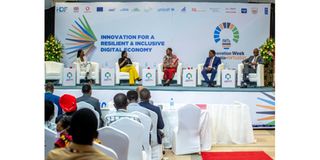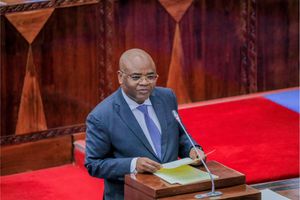Government targets 80 percent internet access in Tanzania by 2025

What you need to know:
- The country has so far 43.7 million mobile phone subscribers, but only 23.1 million of them accessing internet, with up to 86 per cent locked out in rural areas compared to 44.6 per cent in urban areas
Dar es Salaam. The government is inviting investors to establish mobile phone assembly lines in Tanzania to tap into a huge market of those not served, with a goal to reach 80 percent of internet users by 2025.
The country has so far 43.7 million mobile phone subscribers but only 23.1 million of them get internet, with up to 86 per cent locked out in rural areas compared to 44.6 per cent in urban areas.
According to the Commission for Science and Technology (COSTECH) director general, Mr Amos Nungu, the availability of affordable smartphones would revolutionise the internet use and help spur economic growth.
Mr Nungu spoke on Saturday during a media symposium ahead of Innovation Week that starts today across the country themed: “Innovation for a Resilience and Inclusive Digital Economy.”
Innovation Week is curated by the Human Development Innovation Fund (HDIF), United Nations Development Programme (UNDP) and COSTECH, with support from UKAid and other partners and sponsors. The purpose of Innovation Week is to inspire current and future leaders in the country to take risks on new ideas, collaborate across sectors and transform Tanzania through the impact of innovation.
In Dar es Salaam, stakeholders will be meeting at the LAPF towers in Makumbusho area for the week-long show casing and knowledge sharing event.
At the media workshop on Saturday, Mr Nungu said the Tanzania Communications Regulatory Authority (TCRA) was working closely with stakeholders to ensure a majority of Tanzanians afford smartphones to access internet. “The government wants an inclusive digital economy that will ensure all people from all walks of life including the marginalised have access to the internet,” he said.
The government, he noted, aimed to ensure the optic fibre is in both rural and urban areas.
Meanwhile the Ministry of Education, Science, Technology and Vocational Training, Science Technology and Innovation Officer, Tabitha Etutu, said the government has put up a policy and guidelines to identify, recognize and promote innovators in the country.
She said the government was supporting both innovation and traditional practices that aimed at improving services.
“Traditional practices have not been adequately promoted despite the fact that they can come up with a cure for some disease, so far modern medicine cannot cure sickle cell,” she said.
She noted that during the National Competition for Science Innovation (Makisato) that took place in Dodoma a week ago, more than 1708 innovators exhibited their work, with 130 out of them supported by the government.
For his part, Mwananchi Communications Ltd (MCL), Habari Hub, Digital Advisor, Mr Mihayo Wilmore, said 10 years ago MCL started its digital transformation to enable the public access news fast online through their smartphones. He, however, noted that for digital services to attract followers they have to depend on foreign platforms which can be suspended or withdrawn and thus affect local services.
“It is imperative Tanzania comes up with its own platforms for artificial intelligence because we cannot continue attracting followers through foreign platforms,” he said. He suggested that such local platforms should use native language and culture (Kiswahili).
For his part, the Human Development Innovation Fund (HDIF) Country Director, Joseph Manirakiza said inclusive innovation ensures the marginalised women, girls and rural communities are onboard.
“Normally when advancing there are groups that are forgotten and therefore it is imperative to ensure inclusive policies,” he said.
Meanwhile, UNDP, Head of Inclusive Growth Pillar, Emmanuel Nnko said innovation has created employment of Tanzanians in many fields including agriculture, education among many more.






